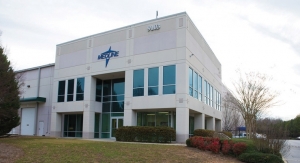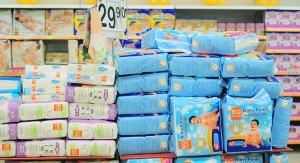01.01.09
Location: TEL AVIV, ISRAEL
Sales: $254 Million
Description: Key Personnel
Shuki Goldwasser, chairman; Nir Peleg, CEO; Achai Bonneh, director
of technology
Plants
Tel Aviv, Israel; Mocksville, NC; Jingmen City, Hubei Province,
China; Uzlovaya, Russia
ISO Status
ISO 9002 Certified
Processes
Spunbonded, meltblown, hydroentangled spunlaid
Brand Names
Zebra, Avspun, Avsoft
Major Markets
Hygiene, Medical, Construction, Agriculture, Furniture, Upholstery
With 85% of its output continuing to target hygiene markets, Avgol’s strategy centers on consistently delivering top quality, low basis weight spunmelt products around the world. The company is riding out the economic turbulence by keeping its head down and focusing squarely on its core capabilities. “We continue to grow with our major customers, providing them with better, lower weight versions of the products we’ve been making all along,” stated Dennis Durkin. “We have expanded to the point that we are now able to quickly deliver our products in all corners of the world.”
In light of current worldwide economic hurdles, Avgol is pleased with its $254 million in sales in 2008, a 7% bump up from the previous year. “Resin prices are a huge factor when it comes to revenue, and it makes it difficult to judge what kind of year a company had strictly based on sales figures. For instance, our 2009 sales may actually decrease, but there’s a good chance that we’ll have an even better year than in 2008.” Meanwhile, Mr. Durkin described 2008 as a year where producers were faced with the worst resin pricing in history.
In terms of current challenges, excess global hygiene capacity tops the list for Avgol. Some excess capacity stems from First Quality’s acquisition of Covidien last year, but other recent examples of spunmelt installations include a new multibeam Reicofil machine in Hazleton, PA from First Quality as well as PGI’s new state-of-the-art spunbond line in San Luis Potosi, Mexico. Concerns of overcapacity are being exacerbated by announced investments by Fitesa and Companhia Providencia, which so far have not come to fruition.
“Frankly, we were scratching our heads and wondering what Fitesa and Providencia were seeing that we weren’t,” remarked Mr. Durkin. “The fact is there’s excess capacity and plenty of people out there selling. In South America, companies are trying to justify their potential investments here in North America. At least in North America, spunmelt is a relatively difficult market right now that could get even more challenging as new investments from either Fitesa or Providencia come online.”
In addition to these challenges, Avgol is still regrouping its customer mix following First Quality’s purchase of Covidien, which sent a tidal wave through the spunmelt chain last year. “It’s no secret that this had a dramatic effect on our business,” he said. “We recovered from most of it by late 2008 by adding new customers to fill most of that gap. We still have global system capacity.” Prior to the purchase, Covidien’s business represented approximately 30-35% of Avgol’s worldwide revenue.
Outside of North America, Avgol has been in the process of expanding and has set its sights on both China and Russia as markets with growth potential. The company announced in January that it will add a second Reifenhauser polypropylene line in Jingmen in Hubei Province, 1000 miles west of Shanghai, with an annual capacity of 15,000 tons. The facility is jointly owned by Avgol and China’s Hubei Gold Dragon Nonwoven Fabric Co. Ltd., which produces SMS fabrics at the Jingmen site. Avgol has also increased its stake in the Chinese joint venture from 50% to 70%.
“The new line is coming along well and will be running, as expected, in the second quarter of 2010,” reported Mr. Durkin. “Preparations are being made and we’re already taking delivery of equipment. We’re optimistic about growth in this region and
about the support we’ve received from global and regional customers who are pushing us to expand into increasingly lower weight materials.” Mr. Durkin added that producers with Reicofil equipment may have difficulty competing in China on certain high weight, low tech applications now, but he expects this to change as demand becomes more sophisticated and the need for higher performing, lower cost materials increase.
“This will change how the market in China looks,” he predicted. “As big players come in and set up shop, needs will change and we’ll see continued growth of low basis weights. We’re beginning to see this in hygiene already and the medical market is growing as well. There’s an increasing need for higher quality medical grade materials.”
As for Avgol’s recent strides in the Russian market, the company’s new line is up and running and supplying commercial grade materials to local customers. Based in Uzlovaya, which is in the Tula region of Russia and 200 km south of Moscow, the new line boasts a capacity of 10,000 metric tons of SMMS material and serves hygiene and industrial applications. “Russia is actually starting to do well and the plant has just recently come pretty close to capacity. We have no current plans to expand in Russia, but I wouldn’t be surprised to see plans develop in the next 18-24 months. This is a great potential market for us but we’ll take our cue from the local customer base about adding capacity,” Mr. Durkin continued.
In Israel, where Avgol is headquartered, the company’s five spunmelt lines continue to service local customers as well as some markets in Europe and the Middle East. “The lines in Israel represent about 30% of our business and are doing fine. We have no plans to expand capacity at this time. We’ve continually upgraded the lines as they have aged and the older, original lines are being put to good use targeting a variety of higher end industrial applications,” he offered.
At Avgol’s Mocksville, NC facility, plans are moving along to add capabilities to two of its three spunmelt lines, a move that will bump annual capacity by 3500 tons and expand the company’s product range for its existing customer base. “There are two phases of this project, one of which happened in June and the other is scheduled for September. I can’t give any specifics, but these changes will provide us with the ability to make products we couldn’t make before. We’ll be producing enhanced new products at our customers’ requests.” Although the products will initially target hygiene applications, Mr. Durkin indicated that they could spill over into other areas.
In closing, Mr. Durkin highlighted the company’s ongoing commitment to the spunmelt market. “We will continue to concentrate on better products for a variety of hygiene applications where our technologies are best suited. We don’t know where our recent upgrades will bring us, but for now, we’ll focus on our core lightweight offerings. Our 8-13 gsm products have fueled our growth and we’re now ‘Taking Our Innovation Around the World.’”
Sales: $254 Million
Description: Key Personnel
Shuki Goldwasser, chairman; Nir Peleg, CEO; Achai Bonneh, director
of technology
Plants
Tel Aviv, Israel; Mocksville, NC; Jingmen City, Hubei Province,
China; Uzlovaya, Russia
ISO Status
ISO 9002 Certified
Processes
Spunbonded, meltblown, hydroentangled spunlaid
Brand Names
Zebra, Avspun, Avsoft
Major Markets
Hygiene, Medical, Construction, Agriculture, Furniture, Upholstery
With 85% of its output continuing to target hygiene markets, Avgol’s strategy centers on consistently delivering top quality, low basis weight spunmelt products around the world. The company is riding out the economic turbulence by keeping its head down and focusing squarely on its core capabilities. “We continue to grow with our major customers, providing them with better, lower weight versions of the products we’ve been making all along,” stated Dennis Durkin. “We have expanded to the point that we are now able to quickly deliver our products in all corners of the world.”
In light of current worldwide economic hurdles, Avgol is pleased with its $254 million in sales in 2008, a 7% bump up from the previous year. “Resin prices are a huge factor when it comes to revenue, and it makes it difficult to judge what kind of year a company had strictly based on sales figures. For instance, our 2009 sales may actually decrease, but there’s a good chance that we’ll have an even better year than in 2008.” Meanwhile, Mr. Durkin described 2008 as a year where producers were faced with the worst resin pricing in history.
In terms of current challenges, excess global hygiene capacity tops the list for Avgol. Some excess capacity stems from First Quality’s acquisition of Covidien last year, but other recent examples of spunmelt installations include a new multibeam Reicofil machine in Hazleton, PA from First Quality as well as PGI’s new state-of-the-art spunbond line in San Luis Potosi, Mexico. Concerns of overcapacity are being exacerbated by announced investments by Fitesa and Companhia Providencia, which so far have not come to fruition.
“Frankly, we were scratching our heads and wondering what Fitesa and Providencia were seeing that we weren’t,” remarked Mr. Durkin. “The fact is there’s excess capacity and plenty of people out there selling. In South America, companies are trying to justify their potential investments here in North America. At least in North America, spunmelt is a relatively difficult market right now that could get even more challenging as new investments from either Fitesa or Providencia come online.”
In addition to these challenges, Avgol is still regrouping its customer mix following First Quality’s purchase of Covidien, which sent a tidal wave through the spunmelt chain last year. “It’s no secret that this had a dramatic effect on our business,” he said. “We recovered from most of it by late 2008 by adding new customers to fill most of that gap. We still have global system capacity.” Prior to the purchase, Covidien’s business represented approximately 30-35% of Avgol’s worldwide revenue.
Outside of North America, Avgol has been in the process of expanding and has set its sights on both China and Russia as markets with growth potential. The company announced in January that it will add a second Reifenhauser polypropylene line in Jingmen in Hubei Province, 1000 miles west of Shanghai, with an annual capacity of 15,000 tons. The facility is jointly owned by Avgol and China’s Hubei Gold Dragon Nonwoven Fabric Co. Ltd., which produces SMS fabrics at the Jingmen site. Avgol has also increased its stake in the Chinese joint venture from 50% to 70%.
“The new line is coming along well and will be running, as expected, in the second quarter of 2010,” reported Mr. Durkin. “Preparations are being made and we’re already taking delivery of equipment. We’re optimistic about growth in this region and
about the support we’ve received from global and regional customers who are pushing us to expand into increasingly lower weight materials.” Mr. Durkin added that producers with Reicofil equipment may have difficulty competing in China on certain high weight, low tech applications now, but he expects this to change as demand becomes more sophisticated and the need for higher performing, lower cost materials increase.
“This will change how the market in China looks,” he predicted. “As big players come in and set up shop, needs will change and we’ll see continued growth of low basis weights. We’re beginning to see this in hygiene already and the medical market is growing as well. There’s an increasing need for higher quality medical grade materials.”
As for Avgol’s recent strides in the Russian market, the company’s new line is up and running and supplying commercial grade materials to local customers. Based in Uzlovaya, which is in the Tula region of Russia and 200 km south of Moscow, the new line boasts a capacity of 10,000 metric tons of SMMS material and serves hygiene and industrial applications. “Russia is actually starting to do well and the plant has just recently come pretty close to capacity. We have no current plans to expand in Russia, but I wouldn’t be surprised to see plans develop in the next 18-24 months. This is a great potential market for us but we’ll take our cue from the local customer base about adding capacity,” Mr. Durkin continued.
In Israel, where Avgol is headquartered, the company’s five spunmelt lines continue to service local customers as well as some markets in Europe and the Middle East. “The lines in Israel represent about 30% of our business and are doing fine. We have no plans to expand capacity at this time. We’ve continually upgraded the lines as they have aged and the older, original lines are being put to good use targeting a variety of higher end industrial applications,” he offered.
At Avgol’s Mocksville, NC facility, plans are moving along to add capabilities to two of its three spunmelt lines, a move that will bump annual capacity by 3500 tons and expand the company’s product range for its existing customer base. “There are two phases of this project, one of which happened in June and the other is scheduled for September. I can’t give any specifics, but these changes will provide us with the ability to make products we couldn’t make before. We’ll be producing enhanced new products at our customers’ requests.” Although the products will initially target hygiene applications, Mr. Durkin indicated that they could spill over into other areas.
In closing, Mr. Durkin highlighted the company’s ongoing commitment to the spunmelt market. “We will continue to concentrate on better products for a variety of hygiene applications where our technologies are best suited. We don’t know where our recent upgrades will bring us, but for now, we’ll focus on our core lightweight offerings. Our 8-13 gsm products have fueled our growth and we’re now ‘Taking Our Innovation Around the World.’”
















